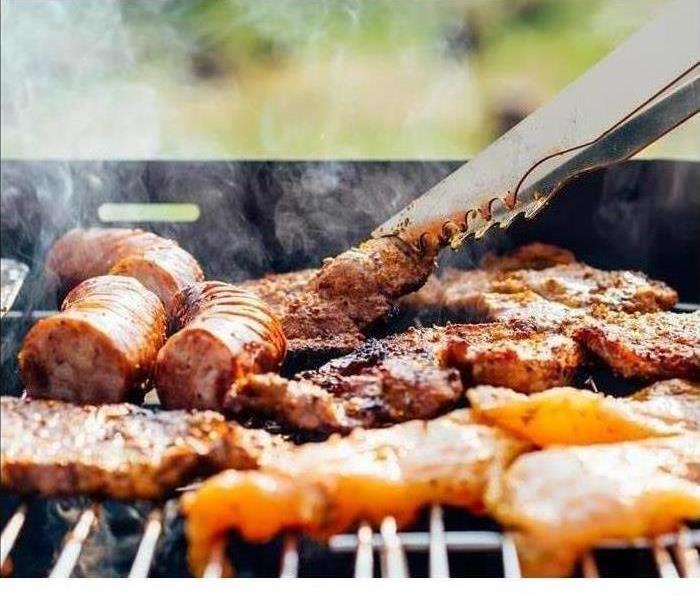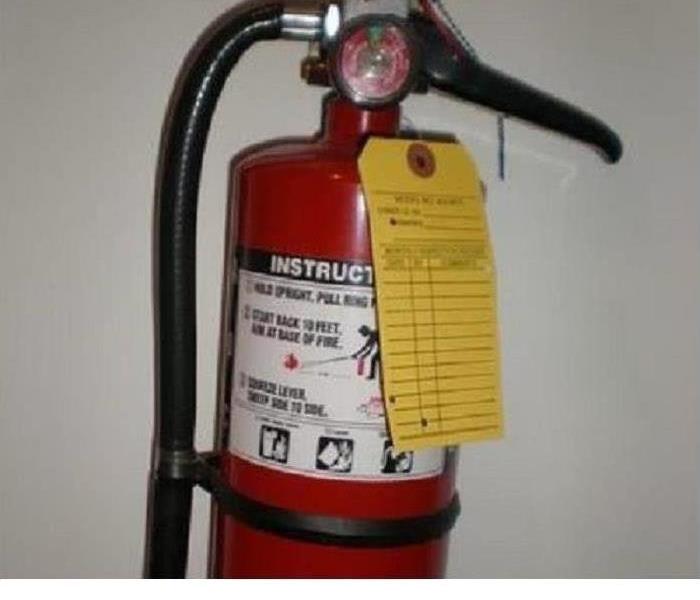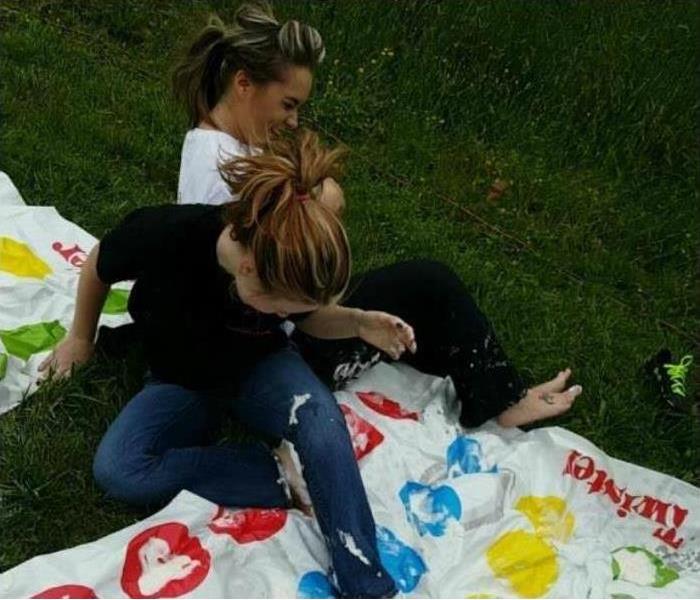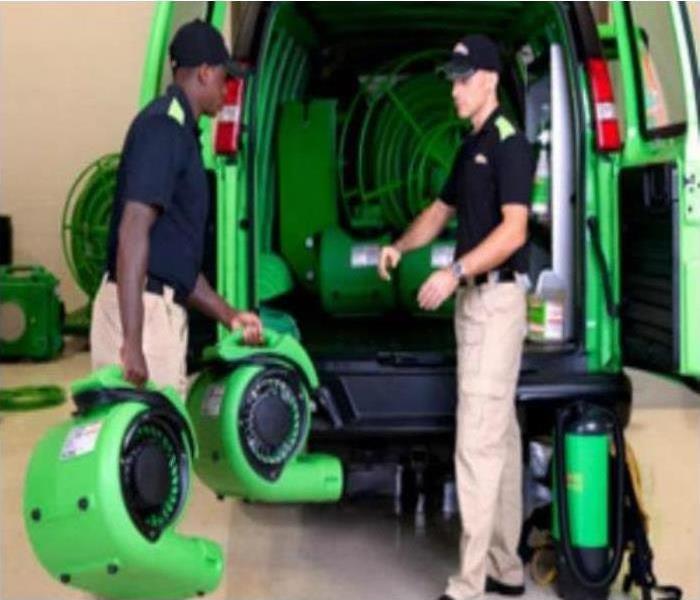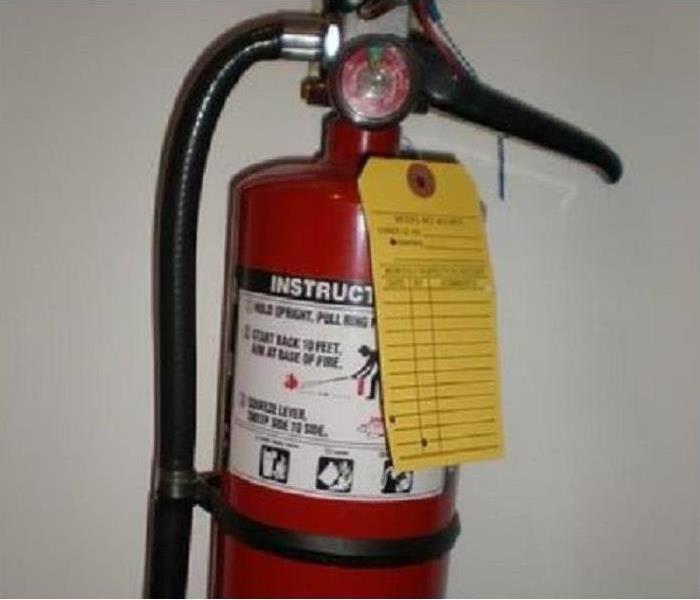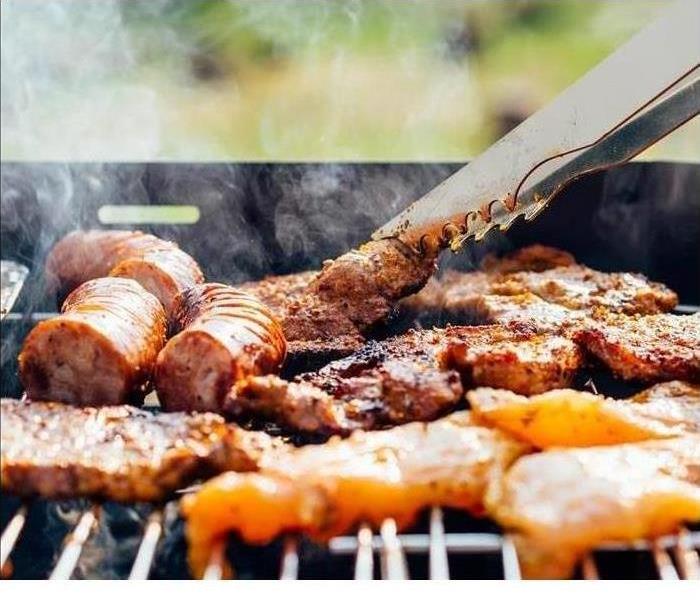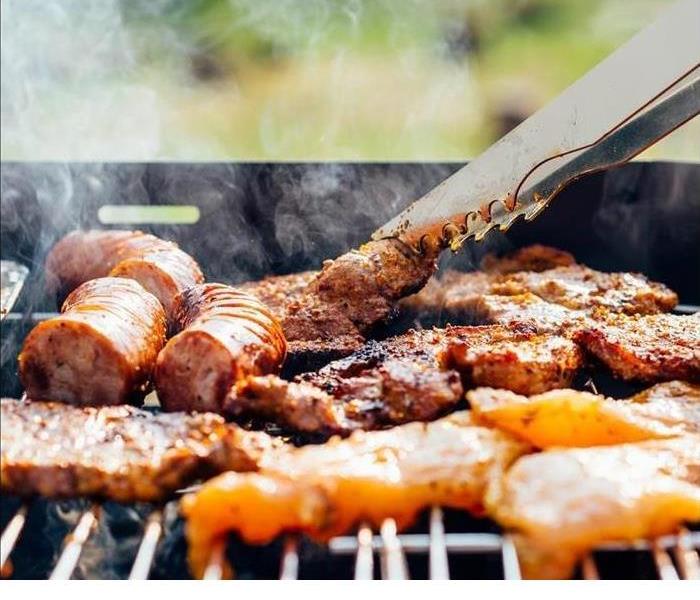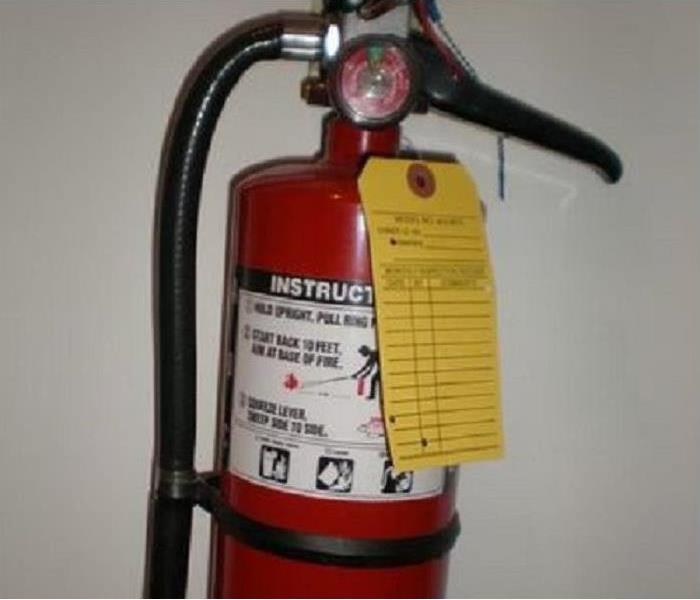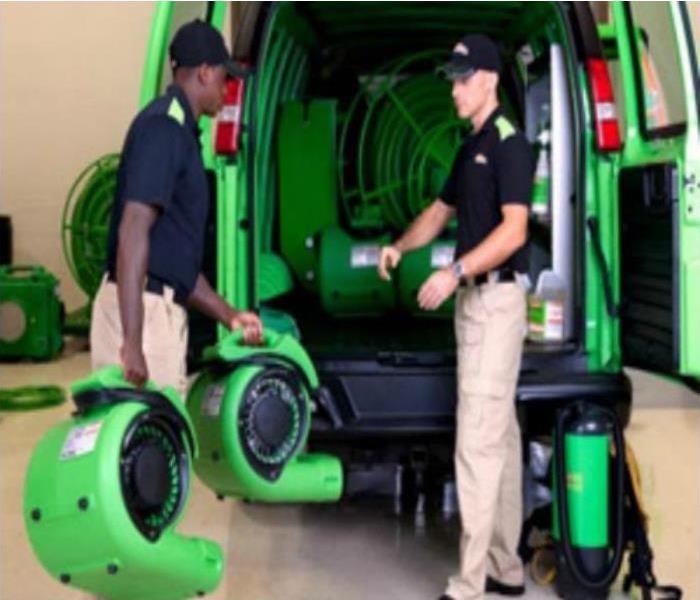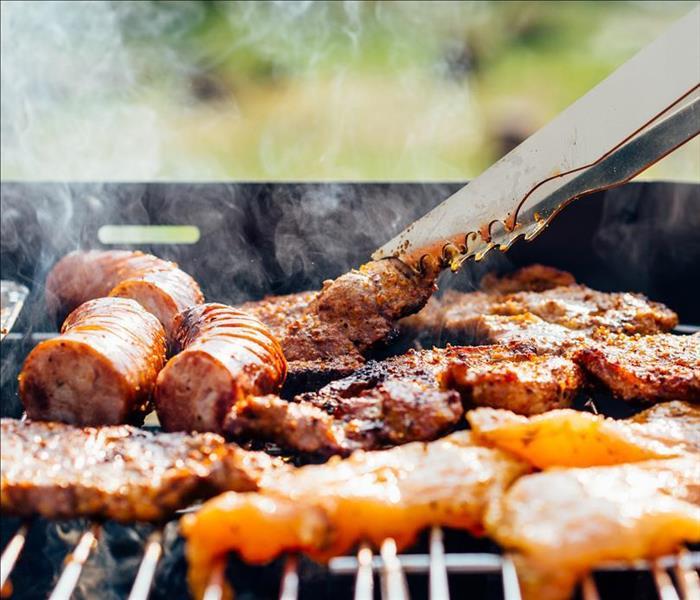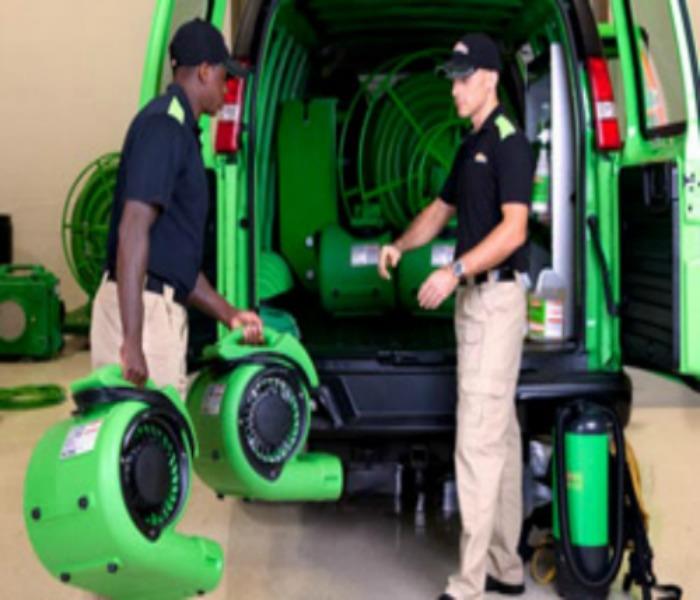Archived Community Blog Posts
Summer Safety Tips!
7/26/2018 (Permalink)
Summer is synonymous with barbecues, parades and fireworks displays; but along with all the festivities are plenty of visits to emergency rooms-especially during July.
In 2013, eight people died and about 11,400 were injured badly enough to require medical treatment after fireworks-related incidents, according to the U.S. Consumer Product Safety Commission. In addition to causing injury, fireworks are also responsible for thousands of house fires each year with millions of dollars in property damage.
There is nothing like firing up the grill during the summer months! Did you know, July is the peak month for grills fires? A backyard barbecue can become dangerous quickly if proper safety precautions aren't considered. SERVPRO of Union, Towns, Fannin & Gilmer Counties wants you to have an enjoyable and safe summer.
Consider the following tips to ensure your summer celebrations are disaster-free!
- Propane and charcoal BBQ grills should only be used outdoors.
- The grill should be placed well away from the home, deck railings and out from under eaves and overhanging branches.
- Keep children and pets away from grill area.
- Keep your grill clean by removing grease or fat buildup from the grills and in trays below the grill.
- When using a charcoal grill, let the coals completely cool before disposing in a metal container.
- Never leave your grill unattended.
- Anyone using fireworks or standing nearby should wear protective eyewear.
- Do not try to re-light or handle malfunctioning fireworks. Keep a bucket of water nearby to fully extinguish fireworks that don't go off or in case of fire. Children should never pick up fireworks that may be left over, as they may still be active.
- The safest way to enjoy fireworks is to attend a public display conducted by trained professionals.
Choosing the Proper Fire Extinguisher
7/17/2018 (Permalink)
A fire extinguisher can be a life-saving tool when used correctly. The U.S. Fire Administration (USFA) recommends individuals are properly trained in order to use and maintain an extinguisher.
USFA says an extinguisher should only be used if:
- You have alerted other occupants and someone has called the fire department.
- The fire is small and contained to a single object, such as a wastebasket.
- You are safe from the toxic smoke produced by the fire.
- You have a means of escape identified and the fire is not between you and the fire escape route.
- Your instincts tell you that it is safe to use an extinguisher.
Classes of Fire Extinguishers:
Class A: Use on ordinary combustible materials, such as cloth, wood, rubber, paper, and many plastics.
Class B: Use on flammable liquids, such as grease, gasoline and oil.
Class C: Use on appliances, tools, or other equipment that is electrically energized or plugged in.
Class D: Use on flammable metals and are often specific for the type of metal in question. These are typically found only in factories working with these metals.
Class K: Use on vegetable oils, animal oils, or fats in cooking appliances. These are generally found in commercial kitchens, but are suitable for the residential market.
Check out the Fire Equipment Manufacturers Association for more information about fire extinguisher use, type and care.
How To Choose Water Damage Restoration Services
7/17/2018 (Permalink)
When a storm leaves a home flooded, or a burst pipe causes serious issues in the house, getting water damage restoration services from a respected company should be considered a top priority. Unfortunately, this industry is not regulated, and there are people out there who pose as professionals or overstate their qualifications. Therefore, homeowners should be mindful of who they hire, as an untrained technician may do more harm than good or delay repairs, resulting in a higher degree of destruction. Before selecting a company to handle the job, keep in mind these points of emphasis:
· Only choose certified professionals to perform water damage restoration services. Even though the industry is not regulated, technicians who have received certification have made the effort to get the best training possible, proving that they take their job seriously. Certification through the Institute of Inspection, Cleaning and Restoration Certification (IICRC) is a sign that a professional has received the most up to date training and is knowledgeable in the latest techniques and technologies employed during repairs. The IICRC operates a Certified Firm registrant-only database on its site, making it easy to find a local, certified professional without trouble.
· Do not select a technician based only on the price or an insurance company’s recommendation. When possible, speak to neighbors or friends who have had to hire a technician recently and try to get a recommendation from them. Insurance companies often select a restoration company based on price, and unusually low pricing suggests the company does not use modern drying or repair methods.
· Choose a company that offers a range of water damage restoration services. The easiest way to determine the expertise of a firm is to see if they provide a full range of options for homeowners. Mold remediation, for example, is often needed given how quickly mold can set in. This is a standard field of knowledge that advanced technicians should possess. If a company doesn’t offer mold remediation, it may not be prepared for all job settings.
· A company that is available 24/7 is a good sign. Stay away from any firms that are reluctant to start right away. In many cases modern equipment can enable near-complete drying in as little as 36 hours, although many situations require longer. Also, a homeowner should not have to wait before repairs begin. Every minute counts when there is standing water present, and reputable professionals understand this. If a technician insists on waiting to begin the remediation portion of the loss, they probably cannot be trusted to see the job through in a reasonable timeframe.
Using these guidelines, a homeowner should be able to find a technician that can be trusted and is equipped to do the job the right way. A storm or other disaster is hard enough to deal with, and a remediation firm should do everything in its power to make this difficult process easier.
http://www.IICRC.org/
Summer Safety Tips!
3/22/2018 (Permalink)
Summer is synonymous with barbecues, parades and fireworks displays; but along with all the festivities are plenty of visits to emergency rooms-especially during July.
In 2013, eight people died and about 11,400 were injured badly enough to require medical treatment after fireworks-related incidents, according to the U.S. Consumer Product Safety Commission. In addition to causing injury, fireworks are also responsible for thousands of house fires each year with millions of dollars in property damage.
There is nothing like firing up the grill during the summer months! Did you know, July is the peak month for grills fires? A backyard barbecue can become dangerous quickly if proper safety precautions aren't considered. SERVPRO of Union, Towns, Fannin & Gilmer Counties wants you to have an enjoyable and safe summer. Consider the following tips to ensure your summer celebrations are disaster-free!
- Propane and charcoal BBQ grills should only be used outdoors.
- The grill should be placed well away from the home, deck railings and out from under eaves and overhanging branches.
- Keep children and pets away from grill area.
- Keep your grill clean by removing grease or fat buildup from the grills and in trays below the grill.
- When using a charcoal grill, let the coals completely cool before disposing in a metal container.
- Never leave your grill unattended.
- Anyone using fireworks or standing nearby should wear protective eyewear.
- Do not try to re-light or handle malfunctioning fireworks. Keep a bucket of water nearby to fully extinguish fireworks that don't go off or in case of fire. Children should never pick up fireworks that may be left over, as they may still be active.
- The safest way to enjoy fireworks is to attend a public display conducted by trained professionals.
Choosing the Proper Fire Extinguisher
3/22/2018 (Permalink)
A fire extinguisher can be a life-saving tool when used correctly. The U.S. Fire Administration (USFA) recommends individuals are properly trained in order to use and maintain an extinguisher.
USFA says an extinguisher should only be used if:
- You have alerted other occupants and someone has called the fire department.
- The fire is small and contained to a single object, such as a wastebasket.
- You are safe from the toxic smoke produced by the fire.
- You have a means of escape identified and the fire is not between you and the fire escape route.
- Your instincts tell you that it is safe to use an extinguisher.
Classes of Fire Extinguishers:
Class A: Use on ordinary combustible materials, such as cloth, wood, rubber, paper, and many plastics.
Class B: Use on flammable liquids, such as grease, gasoline and oil.
Class C: Use on appliances, tools, or other equipment that is electrically energized or plugged in.
Class D: Use on flammable metals and are often specific for the type of metal in question. These are typically found only in factories working with these metals.
Class K: Use on vegetable oils, animal oils, or fats in cooking appliances. These are generally found in commercial kitchens, but are suitable for the residential market.
Check out the Fire Equipment Manufacturers Association for more information about fire extinguisher use, type and care.
How To Choose Water Damage Restoration Services
3/22/2018 (Permalink)
When a storm leaves a home flooded, or a burst pipe causes serious issues in the house, getting water damage restoration services from a respected company should be considered a top priority. Unfortunately, this industry is not regulated, and there are people out there who pose as professionals or overstate their qualifications. Therefore, homeowners should be mindful of who they hire, as an untrained technician may do more harm than good or delay repairs, resulting in a higher degree of destruction. Before selecting a company to handle the job, keep in mind these points of emphasis:
· Only choose certified professionals to perform water damage restoration services. Even though the industry is not regulated, technicians who have received certification have made the effort to get the best training possible, proving that they take their job seriously. Certification through the Institute of Inspection, Cleaning and Restoration Certification (IICRC) is a sign that a professional has received the most up to date training and is knowledgeable in the latest techniques and technologies employed during repairs. The IICRC operates a Certified Firm registrant-only database on its site, making it easy to find a local, certified professional without trouble.
· Do not select a technician based only on the price or an insurance company’s recommendation. When possible, speak to neighbors or friends who have had to hire a technician recently and try to get a recommendation from them. Insurance companies often select a restoration company based on price, and unusually low pricing suggests the company does not use modern drying or repair methods.
· Choose a company that offers a range of water damage restoration services. The easiest way to determine the expertise of a firm is to see if they provide a full range of options for homeowners. Mold remediation, for example, is often needed given how quickly mold can set in. This is a standard field of knowledge that advanced technicians should possess. If a company doesn’t offer mold remediation, it may not be prepared for all job settings.
· A company that is available 24/7 is a good sign. Stay away from any firms that are reluctant to start right away. In many cases modern equipment can enable near-complete drying in as little as 36 hours, although many situations require longer. Also, a homeowner should not have to wait before repairs begin. Every minute counts when there is standing water present, and reputable professionals understand this. If a technician insists on waiting to begin the remediation portion of the loss, they probably cannot be trusted to see the job through in a reasonable timeframe.
Using these guidelines, a homeowner should be able to find a technician that can be trusted and is equipped to do the job the right way. A storm or other disaster is hard enough to deal with, and a remediation firm should do everything in its power to make this difficult process easier.
http://www.IICRC.org/
Relay for Life 2016
8/18/2017 (Permalink)
SERVPRO of Union, Towns, Fannin and Gilmer Counties had so much fun last Friday at the Relay for Life event in Blue Ridge, GA! Thank you to everyone who came out to support the cause!
What Is Relay?
- Organized, overnight community fundraising walk
- Teams of people camp out around a track
- Members of each team take turns walking around the track
- Food, games and activities provide entertainment and build camaraderie
- Family-friendly environment for the entire community
Because it's a team event, individual participants are not required to be there the entire time. But it's so much fun, you'll find it hard to leave!
SERVPRO of Union, Towns, Fannin & Gilmer Counties specializes in the cleanup and restoration of residential and commercial property after a fire, smoke or water damage event. Our staff is highly trained in property damage restoration and we are an IICRC Certified Firm. We believe in continuous training: from initial and ongoing training at SERVPRO’s corporate training facility to regular IICRC-industry certification, rest assured our staff is equipped with the knowledge to restore your property.
How To Choose Water Damage Restoration Services
7/28/2017 (Permalink)
When a storm leaves a home flooded, or a burst pipe causes serious issues in the house, getting water damage restoration services from a respected company should be considered a top priority. Unfortunately, this industry is not regulated, and there are people out there who pose as professionals or overstate their qualifications. Therefore, homeowners should be mindful of who they hire, as an untrained technician may do more harm than good or delay repairs, resulting in a higher degree of destruction. Before selecting a company to handle the job, keep in mind these points of emphasis:
· Only choose certified professionals to perform water damage restoration services. Even though the industry is not regulated, technicians who have received certification have made the effort to get the best training possible, proving that they take their job seriously. Certification through the Institute of Inspection, Cleaning and Restoration Certification (IICRC) is a sign that a professional has received the most up to date training and is knowledgeable in the latest techniques and technologies employed during repairs. The IICRC operates a Certified Firm registrant-only database on its site, making it easy to find a local, certified professional without trouble.
· Do not select a technician based only on the price or an insurance company’s recommendation. When possible, speak to neighbors or friends who have had to hire a technician recently and try to get a recommendation from them. Insurance companies often select a restoration company based on price, and unusually low pricing suggests the company does not use modern drying or repair methods.
· Choose a company that offers a range of water damage restoration services. The easiest way to determine the expertise of a firm is to see if they provide a full range of options for homeowners. Mold remediation, for example, is often needed given how quickly mold can set in. This is a standard field of knowledge that advanced technicians should possess. If a company doesn’t offer mold remediation, it may not be prepared for all job settings.
· A company that is available 24/7 is a good sign. Stay away from any firms that are reluctant to start right away. In many cases modern equipment can enable near-complete drying in as little as 36 hours, although many situations require longer. Also, a homeowner should not have to wait before repairs begin. Every minute counts when there is standing water present, and reputable professionals understand this. If a technician insists on waiting to begin the remediation portion of the loss, they probably cannot be trusted to see the job through in a reasonable timeframe.
Using these guidelines, a homeowner should be able to find a technician that can be trusted and is equipped to do the job the right way. A storm or other disaster is hard enough to deal with, and a remediation firm should do everything in its power to make this difficult process easier.
http://www.IICRC.org/
Choosing the Proper Fire Extinguisher
7/28/2017 (Permalink)
A fire extinguisher can be a life-saving tool when used correctly. The U.S. Fire Administration (USFA) recommends individuals are properly trained in order to use and maintain an extinguisher.
USFA says an extinguisher should only be used if:
- You have alerted other occupants and someone has called the fire department.
- The fire is small and contained to a single object, such as a wastebasket.
- You are safe from the toxic smoke produced by the fire.
- You have a means of escape identified and the fire is not between you and the fire escape route.
- Your instincts tell you that it is safe to use an extinguisher.
Classes of Fire Extinguishers:
Class A: Use on ordinary combustible materials, such as cloth, wood, rubber, paper, and many plastics.
Class B: Use on flammable liquids, such as grease, gasoline and oil.
Class C: Use on appliances, tools, or other equipment that is electrically energized or plugged in.
Class D: Use on flammable metals and are often specific for the type of metal in question. These are typically found only in factories working with these metals.
Class K: Use on vegetable oils, animal oils, or fats in cooking appliances. These are generally found in commercial kitchens, but are suitable for the residential market.
Check out the Fire Equipment Manufacturers Association for more information about fire extinguisher use, type and care.
Summer Safety Tips!
7/28/2017 (Permalink)
Summer is synonymous with barbecues, parades and fireworks displays; but along with all the festivities are plenty of visits to emergency rooms-especially during July.
In 2013, eight people died and about 11,400 were injured badly enough to require medical treatment after fireworks-related incidents, according to the U.S. Consumer Product Safety Commission. In addition to causing injury, fireworks are also responsible for thousands of house fires each year with millions of dollars in property damage.
There is nothing like firing up the grill during the summer months! Did you know, July is the peak month for grills fires? A backyard barbecue can become dangerous quickly if proper safety precautions aren't considered. SERVPRO of Union, Towns, Fannin & Gilmer Counties wants you to have an enjoyable and safe summer. Consider the following tips to ensure your summer celebrations are disaster-free!
- Propane and charcoal BBQ grills should only be used outdoors.
- The grill should be placed well away from the home, deck railings and out from under eaves and overhanging branches.
- Keep children and pets away from grill area.
- Keep your grill clean by removing grease or fat buildup from the grills and in trays below the grill.
- When using a charcoal grill, let the coals completely cool before disposing in a metal container.
- Never leave your grill unattended.
- Anyone using fireworks or standing nearby should wear protective eyewear.
- Do not try to re-light or handle malfunctioning fireworks. Keep a bucket of water nearby to fully extinguish fireworks that don't go off or in case of fire. Children should never pick up fireworks that may be left over, as they may still be active.
- The safest way to enjoy fireworks is to attend a public display conducted by trained professionals.
Summer Safety Tips!
3/20/2017 (Permalink)
Summer is synonymous with barbecues, parades and fireworks displays; but along with all the festivities are plenty of visits to emergency rooms-especially during July.
In 2013, eight people died and about 11,400 were injured badly enough to require medical treatment after fireworks-related incidents, according to the U.S. Consumer Product Safety Commission. In addition to causing injury, fireworks are also responsible for thousands of house fires each year with millions of dollars in property damage.
There is nothing like firing up the grill during the summer months! Did you know, July is the peak month for grills fires? A backyard barbecue can become dangerous quickly if proper safety precautions aren't considered. SERVPRO of Union, Towns, Fannin & Gilmer Counties wants you to have an enjoyable and safe summer. Consider the following tips to ensure your summer celebrations are disaster-free!
- Propane and charcoal BBQ grills should only be used outdoors.
- The grill should be placed well away from the home, deck railings and out from under eaves and overhanging branches.
- Keep children and pets away from grill area.
- Keep your grill clean by removing grease or fat buildup from the grills and in trays below the grill.
- When using a charcoal grill, let the coals completely cool before disposing in a metal container.
- Never leave your grill unattended.
- Anyone using fireworks or standing nearby should wear protective eyewear.
- Do not try to re-light or handle malfunctioning fireworks. Keep a bucket of water nearby to fully extinguish fireworks that don't go off or in case of fire. Children should never pick up fireworks that may be left over, as they may still be active.
- The safest way to enjoy fireworks is to attend a public display conducted by trained professionals.
Choosing the Proper Fire Extinguisher
3/20/2017 (Permalink)
A fire extinguisher can be a life-saving tool when used correctly. The U.S. Fire Administration (USFA) recommends individuals are properly trained in order to use and maintain an extinguisher.
USFA says an extinguisher should only be used if:
- You have alerted other occupants and someone has called the fire department.
- The fire is small and contained to a single object, such as a wastebasket.
- You are safe from the toxic smoke produced by the fire.
- You have a means of escape identified and the fire is not between you and the fire escape route.
- Your instincts tell you that it is safe to use an extinguisher.
Classes of Fire Extinguishers:
Class A: Use on ordinary combustible materials, such as cloth, wood, rubber, paper, and many plastics.
Class B: Use on flammable liquids, such as grease, gasoline and oil.
Class C: Use on appliances, tools, or other equipment that is electrically energized or plugged in.
Class D: Use on flammable metals and are often specific for the type of metal in question. These are typically found only in factories working with these metals.
Class K: Use on vegetable oils, animal oils, or fats in cooking appliances. These are generally found in commercial kitchens, but are suitable for the residential market.
Check out the Fire Equipment Manufacturers Association for more information about fire extinguisher use, type and care.
How To Choose Water Damage Restoration Services
3/20/2017 (Permalink)
When a storm leaves a home flooded, or a burst pipe causes serious issues in the house, getting water damage restoration services from a respected company should be considered a top priority. Unfortunately, this industry is not regulated, and there are people out there who pose as professionals or overstate their qualifications. Therefore, homeowners should be mindful of who they hire, as an untrained technician may do more harm than good or delay repairs, resulting in a higher degree of destruction. Before selecting a company to handle the job, keep in mind these points of emphasis:
· Only choose certified professionals to perform water damage restoration services. Even though the industry is not regulated, technicians who have received certification have made the effort to get the best training possible, proving that they take their job seriously. Certification through the Institute of Inspection, Cleaning and Restoration Certification (IICRC) is a sign that a professional has received the most up to date training and is knowledgeable in the latest techniques and technologies employed during repairs. The IICRC operates a Certified Firm registrant-only database on its site, making it easy to find a local, certified professional without trouble.
· Do not select a technician based only on the price or an insurance company’s recommendation. When possible, speak to neighbors or friends who have had to hire a technician recently and try to get a recommendation from them. Insurance companies often select a restoration company based on price, and unusually low pricing suggests the company does not use modern drying or repair methods.
· Choose a company that offers a range of water damage restoration services. The easiest way to determine the expertise of a firm is to see if they provide a full range of options for homeowners. Mold remediation, for example, is often needed given how quickly mold can set in. This is a standard field of knowledge that advanced technicians should possess. If a company doesn’t offer mold remediation, it may not be prepared for all job settings.
· A company that is available 24/7 is a good sign. Stay away from any firms that are reluctant to start right away. In many cases modern equipment can enable near-complete drying in as little as 36 hours, although many situations require longer. Also, a homeowner should not have to wait before repairs begin. Every minute counts when there is standing water present, and reputable professionals understand this. If a technician insists on waiting to begin the remediation portion of the loss, they probably cannot be trusted to see the job through in a reasonable timeframe.
Using these guidelines, a homeowner should be able to find a technician that can be trusted and is equipped to do the job the right way. A storm or other disaster is hard enough to deal with, and a remediation firm should do everything in its power to make this difficult process easier.
http://www.IICRC.org/
Towns County Sheriff's Office Empty Stocking Parade
6/13/2016 (Permalink)
We had so much fun participating in Towns County Sheriff's Office Empty Stocking Parade! SERVPRO of Union, Towns, Fannin & Gilmer Counties placed 3rd in the float competition!
Mountain Holiday Fest Shopping Spree Winner
6/13/2016 (Permalink)
We had such a great time shopping with our Mountain Holiday Fest $100 Shopping Spree winner, Wyatt McRae and his father Matthew McRae this Saturday! Be sure to like us on Facebook to keep up with all our community events!
Trap Shoot Event for Georgia's Sheriff's Youth Homes
6/13/2016 (Permalink)
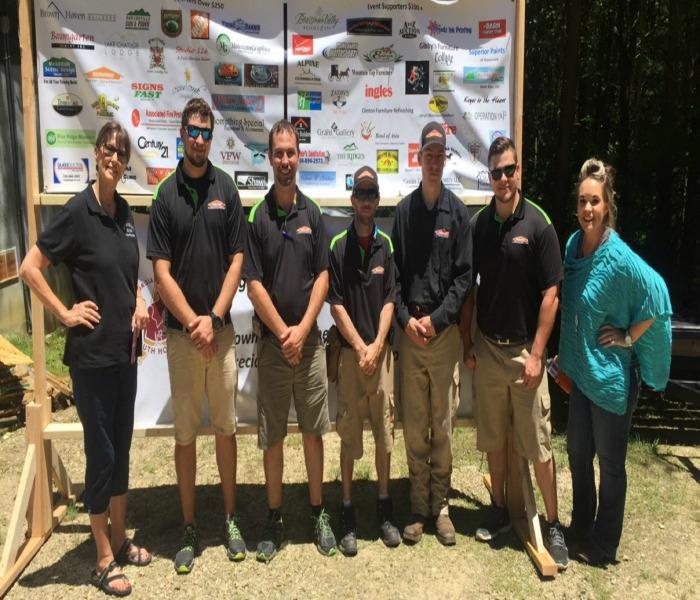 Carnie Wall, Caleb Weaver, Matthew Parton, Roy Johnson, Dalton Taylor, Jesse Gibson and Christine Harriott
Carnie Wall, Caleb Weaver, Matthew Parton, Roy Johnson, Dalton Taylor, Jesse Gibson and Christine Harriott
SERVPRO of Union, Towns, Fannin & Gilmer Counties had a BLAST at the Trap Shoot Event for Georgia's Sheriff's Youth Homes! Thank you to the Towns County Sheriff's Office and to the Towns County CLEA group for making this possible! Our guys definitely enjoyed it!
Summer Safety Tips!
4/21/2016 (Permalink)
Summer is synonymous with barbecues, parades and fireworks displays; but along with all the festivities are plenty of visits to emergency rooms-especially during July.
In 2013, eight people died and about 11,400 were injured badly enough to require medical treatment after fireworks-related incidents, according to the U.S. Consumer Product Safety Commission. In addition to causing injury, fireworks are also responsible for thousands of house fires each year with millions of dollars in property damage.
There is nothing like firing up the grill during the summer months! Did you know, July is the peak month for grills fires? A backyard barbecue can become dangerous quickly if proper safety precautions aren't considered. SERVPRO of Union, Towns, Fannin & Gilmer Counties wants you to have an enjoyable and safe summer. Consider the following tips to ensure your summer celebrations are disaster-free!
- Propane and charcoal BBQ grills should only be used outdoors.
- The grill should be placed well away from the home, deck railings and out from under eaves and overhanging branches.
- Keep children and pets away from grill area.
- Keep your grill clean by removing grease or fat buildup from the grills and in trays below the grill.
- When using a charcoal grill, let the coals completely cool before disposing in a metal container.
- Never leave your grill unattended.
- Anyone using fireworks or standing nearby should wear protective eyewear.
- Do not try to re-light or handle malfunctioning fireworks. Keep a bucket of water nearby to fully extinguish fireworks that don't go off or in case of fire. Children should never pick up fireworks that may be left over, as they may still be active.
- The safest way to enjoy fireworks is to attend a public display conducted by trained professionals.
Choosing the Proper Fire Extinguisher
4/21/2016 (Permalink)
A fire extinguisher can be a life-saving tool when used correctly. The U.S. Fire Administration (USFA) recommends individuals are properly trained in order to use and maintain an extinguisher.
USFA says an extinguisher should only be used if:
- You have alerted other occupants and someone has called the fire department.
- The fire is small and contained to a single object, such as a wastebasket.
- You are safe from the toxic smoke produced by the fire.
- You have a means of escape identified and the fire is not between you and the fire escape route.
- Your instincts tell you that it is safe to use an extinguisher.
Classes of Fire Extinguishers:
Class A: Use on ordinary combustible materials, such as cloth, wood, rubber, paper, and many plastics.
Class B: Use on flammable liquids, such as grease, gasoline and oil.
Class C: Use on appliances, tools, or other equipment that is electrically energized or plugged in.
Class D: Use on flammable metals and are often specific for the type of metal in question. These are typically found only in factories working with these metals.
Class K: Use on vegetable oils, animal oils, or fats in cooking appliances. These are generally found in commercial kitchens, but are suitable for the residential market.
Check out the Fire Equipment Manufacturers Association for more information about fire extinguisher use, type and care.
How To Choose Water Damage Restoration Services
4/12/2016 (Permalink)
When a storm leaves a home flooded, or a burst pipe causes serious issues in the house, getting water damage restoration services from a respected company should be considered a top priority. Unfortunately, this industry is not regulated, and there are people out there who pose as professionals or overstate their qualifications. Therefore, homeowners should be mindful of who they hire, as an untrained technician may do more harm than good or delay repairs, resulting in a higher degree of destruction. Before selecting a company to handle the job, keep in mind these points of emphasis:
· Only choose certified professionals to perform water damage restoration services. Even though the industry is not regulated, technicians who have received certification have made the effort to get the best training possible, proving that they take their job seriously. Certification through the Institute of Inspection, Cleaning and Restoration Certification (IICRC) is a sign that a professional has received the most up to date training and is knowledgeable in the latest techniques and technologies employed during repairs. The IICRC operates a Certified Firm registrant-only database on its site, making it easy to find a local, certified professional without trouble.
· Do not select a technician based only on the price or an insurance company’s recommendation. When possible, speak to neighbors or friends who have had to hire a technician recently and try to get a recommendation from them. Insurance companies often select a restoration company based on price, and unusually low pricing suggests the company does not use modern drying or repair methods.
· Choose a company that offers a range of water damage restoration services. The easiest way to determine the expertise of a firm is to see if they provide a full range of options for homeowners. Mold remediation, for example, is often needed given how quickly mold can set in. This is a standard field of knowledge that advanced technicians should possess. If a company doesn’t offer mold remediation, it may not be prepared for all job settings.
· A company that is available 24/7 is a good sign. Stay away from any firms that are reluctant to start right away. In many cases modern equipment can enable near-complete drying in as little as 36 hours, although many situations require longer. Also, a homeowner should not have to wait before repairs begin. Every minute counts when there is standing water present, and reputable professionals understand this. If a technician insists on waiting to begin the remediation portion of the loss, they probably cannot be trusted to see the job through in a reasonable timeframe.
Using these guidelines, a homeowner should be able to find a technician that can be trusted and is equipped to do the job the right way. A storm or other disaster is hard enough to deal with, and a remediation firm should do everything in its power to make this difficult process easier.
http://www.iicrc.org/
Super Bowl Squares Winners
2/5/2015 (Permalink)
Congratulations to the winners of our 2015 Super Bowl Squares. Allison from Jeff Davis State Farm in Blairsville, Brenda from The Insurance Mart in Blue Ridge X 2 and Haley from Kevin Panter Insurance in Blue Ridge. Glad we could share the excitement with these and a HUGE Thank You to ALL who participated.
Light Up Ellijay Parade
12/5/2014 (Permalink)
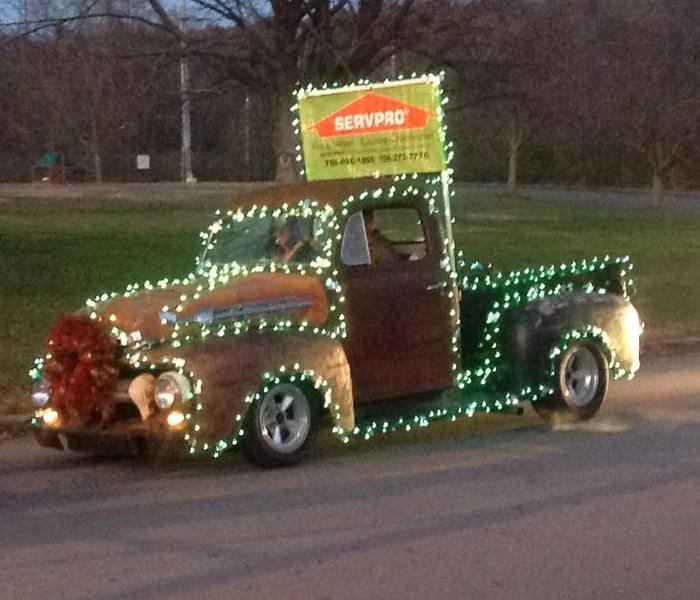 Light Up Ellijay Parade
Light Up Ellijay Parade
Fun Times at the Light Up Ellijay Parade
Winner of Tablet at Kiwanis Rodeo in Blue Ridge
8/21/2014 (Permalink)
Congratulations to Christine Tipton of Copper Hill, TN for being the winner of our give-a-way tablet at the Rodeo in Blue Ridge on August 16th. A huge Thank You for everyone who visited our booth.






 24/7 Emergency Service
24/7 Emergency Service
